Listen to my interview with Jessica Lahey (transcript):
The links in this post are Amazon Affiliate links. If you click these and make a purchase from Amazon, I will receive a small commission at no extra cost to you. Thanks for your support!
Picture this: It’s morning, and your daughter has already left for school. Passing by the kitchen table, you notice her diagram of the solar system lying on one of the chairs, right next to where she was doing her homework the night before. She worked for over an hour on that diagram, measuring each planet to get its size right relative to the others. She colored it carefully, used her neatest printing. It’s due today. And there it is, on a kitchen chair. It was an easy mistake; anyone could have made it. You could have made it. It’s a big grade, and you’re only a short drive away from school.
You have two choices:
(A) Take the homework to school. Within fifteen minutes, that diagram will be in her grateful hands, she can turn it in for full credit, and order will be restored to the universe. Also, your daughter will think you are amazing and wonderful.
(B) Leave it right where it is and let her face the consequences.
In her book, The Gift of Failure, teacher and author Jessica Lahey urges us to choose option B. It’s the harder choice, the one that goes against so many of our parenting instincts. But ultimately, autonomy-supportive parenting—letting our kids deal with the natural consequences of their actions—will help them more quickly develop the skills they need to succeed. In her book, she lays out the research behind why this approach is so necessary, empathizes with parents who have a hard time breaking the “helicopter” habit, and shares tools and tips for making this shift toward parenting and teaching that will help our kids grow into responsible, self-directed, autonomous people.
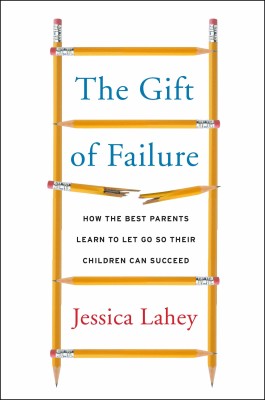
The Gift of Failure: How the Best Parents Learn to Let Go So Their Children Can Succeed
by Jessica Lahey
304 pages, Harper, August 2015
Fail Now, Succeed Later
Pulling together research on motivation, growth mindset, and cognitive psychology, along with insights from thought leaders like Daniel Pink, Lahey explains exactly how failure benefits kids, and why parenting for dependency doesn’t.
“Small failures, when the stakes are relatively low and the potential for emotional and cognitive growth is high, are what psychologists Elizabeth and Robert Bjork call ‘desirable difficulties.’ Learning that comes with challenge is stored more effectively and more durably in the brain than learning that comes easily.”
That means if we make life too easy for our kids, if we rescue them from every fall, they will never learn the important lessons that will carry them through life. And this is most effective, as Lahey puts it, when the stakes are relatively low. That means the earlier we let our kids experience failure, the better off they’ll be.
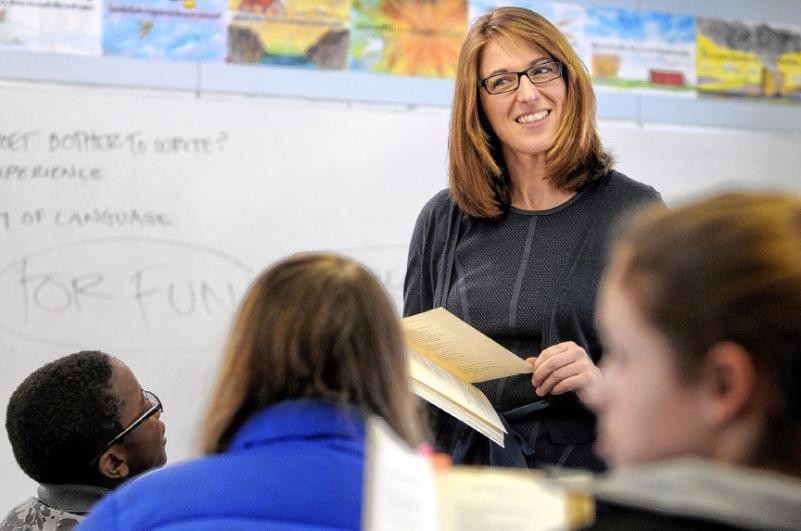
Jessica Lahey, author of The Gift of Failure
In her chapter on middle school, for example, Lahey discusses the problems students encounter with organization and time management. Middle school, she says, is the perfect time to let students experience failure in these areas.
“Let them feel the pain and inconvenience of their mistakes, and then support them in their efforts to rework the bugs. A few missed lunches or a zero on the homework assignment she left on the kitchen counter will reinforce these skills better than your lectures or nagging ever will. Every intervention or rescue is a lesson lost. They need every minute, every learning opportunity inherent in their failures before they face the much greater challenges and consequences that await them right around the corner in high school.”
But even if a parent can grasp this concept in the abstract, even if we agree with it in theory, putting it into practice is much more difficult.
Doing it Right: Guidelines for Anxious Parents
When I first learned about this book, I resisted reading it. I was already familiar with Lahey’s work and I respected her ideas, but I was a little scared. I was worried that she would advise me to let my kids run around the neighborhood unsupervised, choose their own bedtimes, eat whatever they wanted, and behave according to their own guidelines. In short, I thought she was going to tell me to stop parenting.
But when I started to read, I was relieved to find a saner approach.
“Autonomy-supportive parenting is not negligent parenting, and it is not permissive parenting. Autonomy-supportive parents establish specific and clear expectations, make themselves physically and emotionally present, and offer guidance when kids get frustrated or need redirection. The best part about being an autonomy-supportive parent is that all the negative stuff we do to get our children to do the things we want them to do—nagging, nitpicking, hovering, directing—stops. These parenting techniques are destructive to our relationships with our kids, anyway, so parenting in their absence is a more peaceful and enjoyable affair all around.”
Because she is still in the process of breaking old habits, freely admitting all the mistakes she has made in the past, Lahey can empathize with the struggles parents experience when making this shift. She also offers plenty of practical tips and techniques, so we are not left to flail around in a vacuum. She shows us how to validate and support our kids when they are experiencing the negative emotions that come with failure, how to give helpful feedback rather than nagging or criticizing, and the specific things we can do to support them academically without hovering or taking over.
How This Book Can Help Teachers
As I read The Gift of Failure, I couldn’t help but think of my friend who teaches 12th grade English. Just recently she assigned a research paper and discovered that dozens of her students had turned in plagiarized work. Then she had to deal with the parents of those students, many of whom didn’t want them to receive the zeroes they were supposed to get as a result. If those parents had read this book, it’s far more likely they would have been on board with the decision, that they would have supported this teacher, knowing the consequence would likely prevent many more attempts to plagiarize in the future.
But how do we get the book into parents’ hands? As Lahey pointed out in my interview with her (see below), most teachers wouldn’t feel comfortable just handing this book over to individual parents and saying, “You need to read this.” But many schools are choosing this book for their One-Book-One-School program, so that everyone is introduced to the ideas at one time. And as a teacher, reading the book yourself can help you get a better handle on the research behind autonomy-supportive parenting, which will in turn help you do a better job of gently explaining it to parents.
It can also help teachers adopt more autonomy-supportive practices in our own classrooms, giving our students more responsibility for their own learning, cutting back on the nagging and reminding, and eliminating the practice of adding a few extra points to bring that high “C” up to a “B.” If all of us, together, take a deep breath and leave that homework on the chair, our children might actually thank us for it someday. ♦
Further Reading
When I talked to Jessica, she strongly recommended the book How to Raise an Adult: Break Free of the Overparenting Trap and Prepare Your Kid for Success, by Julie Lythcott-Haims. This book takes on the same issue of the damage done by helicopter parenting, but Lythcott-Haims approaches the subject from the perspective of a university dean.
Join my mailing list and get weekly tips, tools, and inspiration — in quick, bite-sized packages — all geared toward making your teaching more effective and fun. To thank you, I’ll send you a free copy of my e-booklet, 20 Ways to Cut Your Grading Time in Half. I look forward to getting to know you better!

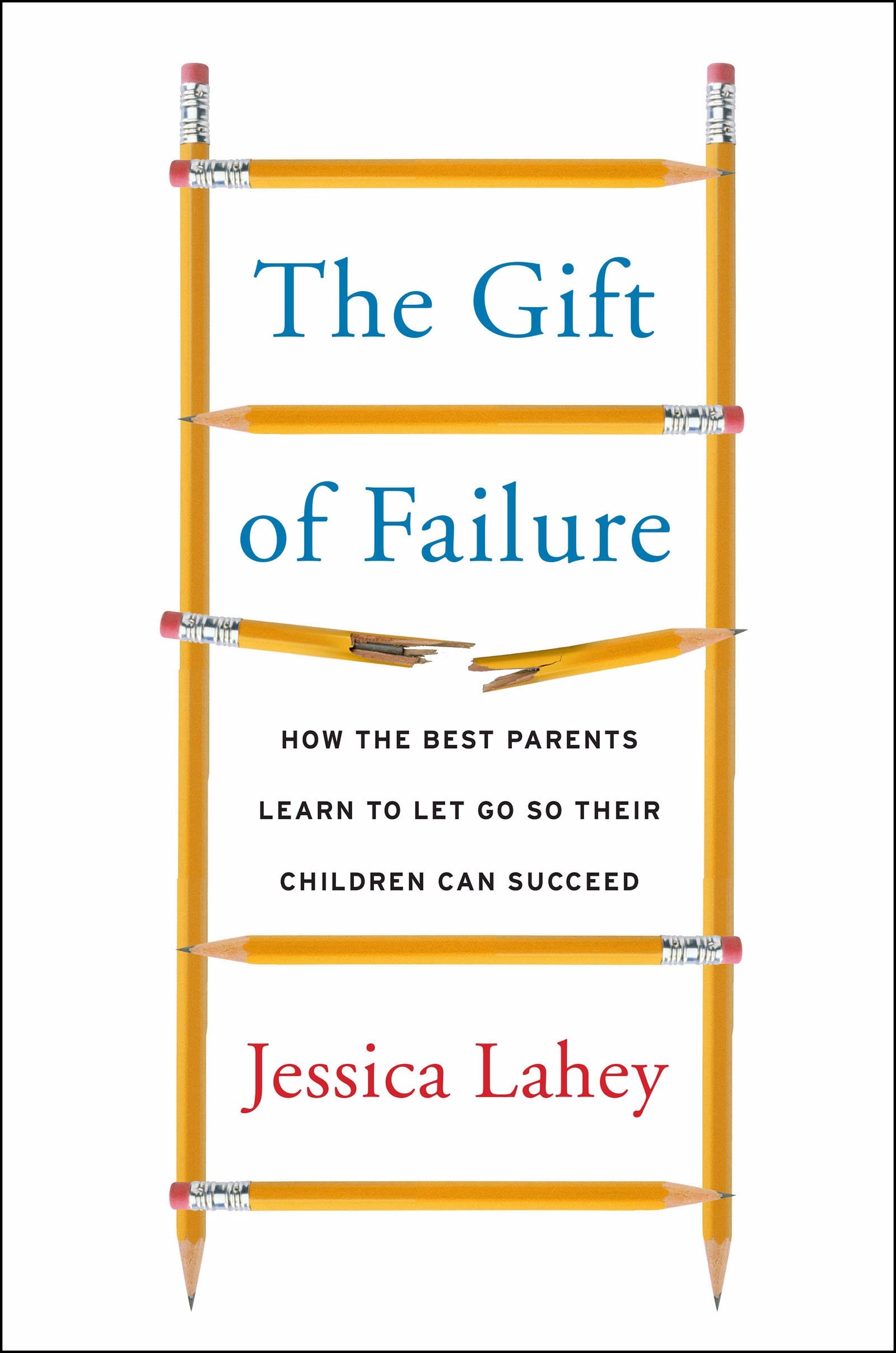
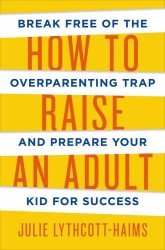
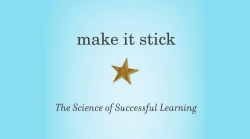
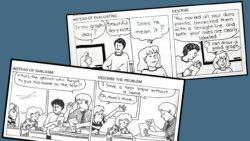
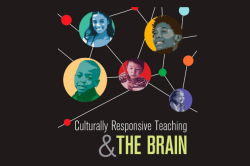

The idea of letting kids fail does sound like a good idea. However, when kids are allowed to fail at school the consequences sometimes can be far more devastating than necessary. Teachers and schools are constantly berating kids and punishing them for not meeting expectations. My sense is that the teachers and schools also enjoy punishing parents and adult guardians as well. They like to make themselves look superior while (“we are so much better at guiding your child than, you the parent, will ever be”) critiquing parents. Teachers and schools frequently deal with parents who are rather young (in age) and/or are less confident, so they are easy to be pushed around. More confident adults who ask even simple questions often wonder why their kids are treated like little inmates. That’s one of the reasons why I did not like letting kids be allowed to ‘fail’ in school situations where the kids and parents were belittled for failing. If you want schools to enable kids to learn from failure, then schools need to not make every failure seem like the end of the world, especially for little kids. Failures should be seen as ways to learn and grow, rather than another, seemingly inevitable, step toward disaster. But thanks for reviewing! I love your blog. maybe I am just a little sensitive on this topic.
Jodie, thanks for sharing your thoughts. You bring up a good point. A parent who is prepared to make this shift toward more autonomy-supportive parenting should be fully aware of what the consequences will be for the child. If you happen to be dealing with a particularly unkind teacher and your child is still young, a forgotten homework assignment may have far worse consequences than it would with a teacher who is working as a partner with you as a parent. Even though I do believe our kids need to learn how to deal with all types of teachers and people and, ultimately, bosses, if they are up against someone truly vindictive, that’s probably not the best time to teach them a lesson. I think every parent should take things on a case-by-case basis and ask ourselves if, in any given situation, we are enabling our child or just helping them, if we are being loving parents or missing an opportunity to let them figure things out for themselves. My big take-away from this book and from talking to Jessica is that I haven’t taken as many opportunities as I could have. Now I’m more likely to be more discerning, rather than just do the thing that’s faster or that makes me feel like a hero.
Thank you Jennifer for your insightful information. I feel that middle school age children find it difficult to maneuver towards responsibility and accountability. They are used to flexing time constraints and their parents being happy with elementary years in education. But middle school expectations, activities, and responsibility towards independence and responsibilities to demonstrate knowledge is critical. Not to mention that this has to be done with many deadlines that are necessary for them to understand fixed time constraints that truly have to be met in real life. Colleges expected this, and successful business work ethics demand it. I truly feel that if parents do not expect their young adults to understand consequences of their actions at an early age, and a vital plan to work their mistakes out with reasonable expectations, then yes, this child will have a difficult time finding a successful job opportunity because they’ve learned that mistakes can be rescued by others. .
Some kids must fail. After all, half of them are below average.
Yeah, I see your point, but if we treat their learning from a “bell curve” perspective, then over half will always fail, right? I don’t love those odds. With any task, some kids will naturally have more ability than others and will succeed more quickly. For others, success will require more attempts. I do think that most kids, with enough perseverance, time, and support, can achieve most goals.
Thank you Jennifer. This is an important topic I have discussed for years.
Still, teachers must be aware not to set kids up for failure. Also, forgetting a diagram on the kitchen table is understandable. Have we been helping our children be organized? Why was her diagram left on the table? Was she up too late?
All important questions about managing workload and health – ones which need to teach our students.
You make a good point, John. One of the best features of this book is that Jessica talks a lot about helping our kids figure out strategies for success, particularly after a failure. The idea is to build self-efficacy, not continually set them up to fall on their faces.
This is a great article! Thank you Jennifer, this is a book we should be recommending a lot, not only because all the good reasons above mentioned but children are so protected from failure by their parents that they simply don’t know how to manage failure. If something doesn’t turn out well the first trial it is labelled as too hard and should not be attempted never again!
All too often, that’s true, isn’t it? I think we can better prepare kids for this kind of experience by calling things “attempts,” which implies that they may not be successful the first time around. I can remember during my National Boards candidacy, my mentor would call us “year 1 candidates,” and let us know that only 40% of candidates would certify on that first try. It helped us set more realistic expectations.
I understand the need for failure will also enhance and strengthen resilience, but I question the need of repetitive failure. And, this maybe along the lines of what Jodie was saying. But, I have a neuro atypical child who is also gifted and learns differently. Unfortunately, despite our efforts through legal educational obligations, some of the teachers don’t get it and his success in school are suffering mightily. I don’t want to be the “helicopter” parent, but if I don’t advocate for him, who will?! Maybe educators should start thinking how to assess all kids differently. I appreciate reading this and allowing a non-educator to see from a different lens.
Thanks for sharing this question, Jodi. My guess is that autonomy-supportive parenting and teaching should extends only as far as it ultimately helps a child develop more autonomy. If letting a child fail doesn’t result in him developing mechanisms to prevent that failure later, it probably needs to be reconsidered for the next time. Your use of the phrase “repetitive failure” is really key here: If we are teaching the same lesson to the same child over and over and it isn’t taking, it’s probably time to go back to the drawing board.
Great article. I also have seen kids fail because their parents refused to allow me to simply give the student a 0, promising me the assignments would come and then they never came because the students were too overwhelmed to begin. I am very quick to give that first 0 generally because it is a great wake-up call that works the majority of the time. Students realize they will not be able to take liberties, and begin to take me and the course seriously. Unfortunately, it is perceived as a lack of love, but it is very loving to allow them to fail in the first thing, usually something that by the end of the course will only affect 1% of their mark, in order to send a clear message. Also, as a high school teacher, I absolutely feel like parents often unnecessarily intervene in these situations. It’s okay for a kid to get a 0 and parents need to not overreact as if it’s the end of the world. This causes students to not be able to deal with little failures and they have a disproportionate view of what is a small failure versus a big failure that is harder to reel from.
Best to learn from failure before high school however, when a low grade can prevent a student from getting into the college or college program of their choice.
I LOVE your podcast, but was not a big fan of this interview. I understand the perspective of this author in that students need to know it’s ok to fail (i.e. growth mindset). What I did not agree with was her stance on programs that post grades for parents. I am both a teacher/librarian and a parent, and I fall squarely in the camp of not even really knowing how to check my kids’ grades. But I fully support those parents who do a better job than me of accessing grades and holding kids accountable. I get that Lahey is aiming at helicopter parents who scrupulously monitor and then attack teachers when the grades aren’t what they expect (the “my kid is perfect, it must be the teachers’ fault” syndrome). But I think this is a case of throwing the baby out with the bathwater. Full disclosure should be a good thing, shouldn’t it? And making grades available online for parents and students to see should open up a dialogue when things aren’t as they seem. Should we punish those parents who use these programs appropriately because of the few who are overly involved? I’m not sure I have the answer here, or that I’m even right. It just didn’t sit right with me as I was listening.
Corey, I appreciate your perspective on this, and I think your argument pushes the needle into more balanced territory. Tools are just that–tools–and don’t necessarily have to be eliminated just because some people misuse them. A smart approach for any school with an online grade portal might be to talk with parents about the value of giving students more ownership over their grades and not rescuing them when they mess up. Again, thanks for contributing your thoughts here.
I love this philosophy and was excited to read this book. However, when I started to read it, I was disappointed in the lack of actual authority the author had on the topic. I don’t usually stop reading books, but I would not recommend this book to anyone even though it backs up a philosophy I believe in. I wanted less personal conviction, more substance.
In 2011, years before The Gft of Failure was published, clinical psychologist, parenting expert and author Wendy Mogel, PhD, wrote a book called The Blessing of the B-. It is about raising self-reliant teenagers and a follow-up from her book The Blessing of the Skinned Knee. As a Middle School science teacher, who teaches problem solving as a life and content skill, I have been recommending Dr. Mogel’s books to parents of my students for years. Even the simple New York Times book review alone has been enough to encourage families to partner in my growth mindset philosophy of Fail Foward.
You may find more substance and credibility in Dr. Mogel’s work.
Last year, my child was failing 4 out of 6 classes in 8th grade. This didn’t seem to bother him at all. Was I supposed to continue to allow him to fail? Sure, there were consequences at home; yes, he missed out on field trips and band activities and attended Saturday school; but nothing seemed to matter to him. He preferred failure to the hard work necessary to pass the classes. I don’t see help in this article for situations such as this. Allowing failure to happen doesn’t work on all children.
I think this strategy may not be targeted to cases for a child with particular situations, but average kids.
Love your podcast. I have learned so much from your podcast & your blog.
Great advice for parents as well as teachers!
Wonderful podcast! It was very informative!
This one hurts. Really hurts.
I have ADHD which was undiagnosed throughout my entire journey as a student. ADHD is a condition where the outcomes don’t match your intentions, and where you struggle at the “point of performance”.
At times my parents and teachers tried variations on “letting the consequences do the teaching” – and it only served to destroy my self-esteem, and self-confidence. I found myself unable to trust myself in many situations and developed high levels of school related anxiety despite my achievements and “success” (did i read all the instructions correctly, did i remember to bring the work to school, “i was holding the assignment as i walked through the door and I can’t find it now – where did it go?!” Etc).
This lack of self-belief followed me into the rest of my life and has taken YEARS to work through, and I’m still not fully there.
I think this approach is damaging for many many students, and it takes good conversations to work out what the issue and appropriate response should be.
Keep in mind that I was an appropriate “candidate” for this approach, with no significant issues identified or diagnosed by anyone.
I don’t do this to my students. I put a lot of emphasis on the effort they put in, rather than the outcomes produced. That way they are not unfairly penalized by missing a deadline or forgetting their work when they have actually worked really hard, and know the topic well.
Please know your students, and dont EVER assume that they just don’t care about consequences or that their parents are “covering” for them.
Rachel, thank you for sharing your experiences. I’m so sorry that this post brought up some painful memories. The struggles that come along with having ADHD are definitely real and are much different from the occasional forgotten homework assignment. You are completely right that it is important for us, as educators, to know our students well and to recognize when allowing low-risk failures coupled with support are not making a difference. These patterns can prompt us to dig deeper and explore if there might be something else going on. If you haven’t had the chance to do so, I encourage you to read through some of the other comments on this post. You may find some of the conversations there helpful.